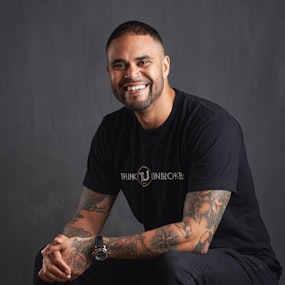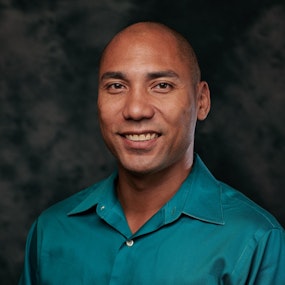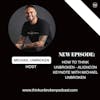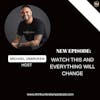There is No Shame in Asking for Help: Mental Health Podcast with James Connor
In this episode, Michael Unbroken, sits down with James Connor, a social entrepreneur, fractional CTO, nonprofit advisor, and digital nomad to discuss the importance of seeking help for mental health issues.
James opens up about his own struggles with mental health, including depression and anxiety, and shares how he sought help and...
See show notes at: https://www.thinkunbrokenpodcast.com/james-connor-there-is-no-shame-in-asking-for-help-mental-health-podcast/#show-notes
In this episode, Michael Unbroken, sits down with James Connor, a social entrepreneur, fractional CTO, nonprofit advisor, and digital nomad to discuss the importance of seeking help for mental health issues.
James opens up about his own struggles with mental health, including depression and anxiety, and shares how he sought help and found the support he needed to overcome his challenges. He emphasizes that there is no shame in asking for help and encourages listeners to reach out to loved ones, seek professional help, and take care of their mental health.
During the conversation, Michael and James also discuss the stigma surrounding mental health issues, the importance of self-care and self-compassion, and the benefits of therapy and counseling. They also explore the role of mindfulness and meditation in mental health and offer practical tips for managing stress and anxiety.
Whether you or someone you know is struggling with mental health issues, this episode offers valuable insights and advice for anyone looking to improve their mental well-being. So tune in now and join the conversation on the Think Unbroken Podcast.
************* LINKS & RESOURCES *************
Learn how to heal and overcome childhood trauma, narcissistic abuse, ptsd, cptsd, higher ACE scores, anxiety, depression, and mental health issues and illness. Learn tools that therapists, trauma coaches, mindset leaders, neuroscientists, and researchers use to help people heal and recover from mental health problems. Discover real and practical advice and guidance for how to understand and overcome childhood trauma, abuse, and narc abuse mental trauma. Heal your body and mind, stop limiting beliefs, end self-sabotage, and become the HERO of your own story.
Join our FREE COMMUNITY as a member of the Unbroken Nation: https://www.thinkunbrokenacademy.com/share/AEGok414shubQSzq?utm_source=manual
Join us for our FREE trauma Transformation conference this December at: unbrokencon.com
Download the first three chapters of the Award-Winning Book Think Unbroken: Understanding and Overcoming Childhood Trauma: https://book.thinkunbroken.com/
Join the Think Unbroken Trauma Transformation Course: https://coaching.thinkunbroken.com/
@Michael Unbroken: https://www.instagram.com/michaelunbroken/
Follow us on TikTok: https://www.tiktok.com/@michaelunbroken
Learn more at https://www.thinkunbrokenpodcast.com
Learn more about James Connor at: https://www.flexiblesites.com/
Support the Podcast: Become a listed sponsor!
Follow me on Instagram @MichaelUnbroken
Learn more about coaching at https://coaching.thinkunbroken.com
Get your FREE copy of my #1 Best-Selling Book Think Unbroken: https://book.thinkunbroken.com/
Michael: Hey! What's up Unbroken Nation! Hope that you're doing well wherever you are in the world today. I'm very excited to be back with you with another episode with my friend, social entrepreneur, James Connor. James, my friend, how are you? What is happening in your world today?
James: Hey, man, Mike, well, I am so happy to be here is great talking with you and I look forward to this time with you and just you telling my story and learning more about you and you know, teaching people hopefully about the things that I've done.
Michael: Yeah, man, I'm super excited. You and I connected a few months ago and I loved your story, I loved your journey. And so, for those who do not know you, tell us a little bit about how you got to where you are today.
James: Yeah, so I wanna say my story started back in high school, you know, as I was growing up, I didn't know a whole bunch of people and I wasn't very popular with the girls. But then something happened when I was in high school and it just changed, right? So, then I met someone, fell in love and what that led to was by the time I was 24, I actually had four children. So, for me, it was a matter of I fell in love with this woman, I was introduced to this group of people and it wasn't necessarily the best crowd for me, it wasn't necessarily, not that I needed to be around with these people that were all very highly successful, had money or anything like that. But we were drinking a lot, we were smoking, we were doing all this stuff, you know, in my twenties, 19 and twenties. But then I was also having these kids with this woman. So, I was kind of digging myself a hole and what I ultimately had to do is I had just dig myself out, you know, pull up my big boy pants, take care of my family, go to school full time, work full time, multiple jobs, and just figure it out and grow up because then I looked up and I sat there and I said, okay, I'm gonna end up 35, 40 years old, and I'm gonna be in the same spot, you know, and I just decided that's not what I wanted. So, I said, okay, what do I need to do? I put out some feelers for some people that I had said, hey, look, how can I turn around? What do I need to do? Give me some guidance, those, that's one of the reasons I work with non-profits today is because there were some non-profit founders that just kind of pulled me in and said, hey, you know, get it together, try this, do that, and, you know, start helping people. And then as I helped people, I started growing up so fast, it was just like, wow, like I complained about a lot of things and I just didn't take what I had it was to the point where I just took things for granted. Right. I mean, you do right, you don't, until you see other things that happen in other people's lives, it is just a matter, it's just eye opening.
Michael: Yeah. I think that's so true for a lot of us. I mean, I can go and trace so much of my life and just taking little things for granted, but I think that's unfortunately a part of the journey. When you talk about the work that you've done for people, why did that matter? Like, how did that play such a big role in your life?
James: Well, one of the things that happened was as I was going to school, I was looking forward with different ways of making money, right? Looking for jobs. One of the things I did was I became an EMT, so then I was out in the ambulance working with other technicians, you know, trying to help save lives. And you will go to some of the most terrible neighborhoods and realize like, hey, you know, there are others that have it worse than I do and those were kind of neighborhoods that we went into because, you know, at that time, the place that I lived in the neighborhood that I was at the community, it wasn't like, you know, a rich or even a middle-class community, it was lower class community. But I felt like, you know, it was a good opportunity for me to get to know people, give back to my community, plus learn a lot about healthcare, medicine, those kinds of things because at the time, that's why I was going to college. I was a pre-med, but then I ended up, I actually ended up going to take a computer science class and just going into the tech world and now I help out non-profits and startup founders with, you know, their technique. So, I've been able to be able to do that and now travel the world as a digital nomad, working on all these different projects, working for different companies as a developer and helping nonprofits, you know, reach their goals and mission because they're not, you know, tech friendly. But that allows me to continue helping people as I did all those years back.
Michael: One of the things I always remember early on in my journey is hearing and really sitting in this idea of like, if you're at your lowest, go and serve like go and be of service, go and help people. And that's a huge part of like what this show is. I'm like, you know, if we can come together and help people, even if it's in this digital space that's so much more than I've ever had access to do right now that doesn't include volunteering and things of that nature, but ultimately, it's through this avenue where I'm like, these matters, right? But I think like a lot of people are disillusioned by how much it matters. Life must have been very chaotic for you right? To be that young four kids, I can't even imagine, dude. Right. And so like, you got four kids, you're trying to go to school, you're working this full-time job. What was there like a rock bottom moment in this? Was there just like oh my God, if I don't like, what became the precursor to the change that ultimately has become your life?
James: So, when we had our second child, so I had my son, and then I had my oldest daughter. I had to make a decision, like it was a very hard decision, and I give credit to the mother of my children. She actually said, no, there's no way you're dropping outta school because I really, really had to think hard about that, right? ‘cause for me, my stress level was way up there I mean, we just with the two kids and it was just a matter of saying, hey look, I might have to drop outta school or go part-time you know, figure it out and we need money. One of the memories I had to go inside the bank to withdraw $7 because I couldn't do it by ATM card. I had to go to the bank teller, fill out a slip, $7 so, I can go buy diapers. And for me, that's why I was like, this has gotta stop, I gotta change like this I can't keep doing this. So, if that was rock bottom, you know, it was there granted, I had two more children after that, but by that time I was actually on the road back, we were happy, life was getting good, but I was actually getting close to graduating. I had people actually saying, James, we want you to do an internship with our company. Things were looking up because I was keeping myself busy, you know, that was the other thing. So those people that I hanging out with, you know, like sometimes we were like, you know, Thursday, Friday, Saturday, I knew I was gonna be drinking, you know, I was a bartender when I was 21, and just started hanging out with that group of people, and it was fun, definitely loved the that time of year, time in my life. But when I became an EMT and I started working for other organizations that needed tech support, it kept me out of that environment. I could then just sit there and concentrate and focus on, okay, how can I get better at this job? How can I get better skills? How can I learn more and continue to grow? And then also I started thinking more about the kids cuz they were getting older, right? It wasn't just so much, now they were walking, now they were more fun, things like that and they needed more of my attention. It wasn't just like, okay, just give 'em a bottle, homeless sleep, you know, those kinds of things. So, as the kids were growing up and I was 23, I really started sitting there thinking like, all right, we're making progress, but we still had a long road to go to.
Michael: Yeah. And I think progress is like this really interesting dichotomy. Right? At least in my experience ‘cuz on the one hand you're like, I'm moving forward and then on the other hand you're like, am I actually moving forward? And it's this really weird thing because you know, how do you see the forest for the trees? And I've certainly had those moments, man, where I'll never forget this. I went and I over drafted my bank account on a pack of gum and I'm like, that was a $35 pack of gum. Right. And to this day, it's probably the most expensive thing I've ever paid for in my life. And you know, you think about those moments and you know, they kind of build you like even though they're difficult and they're hard and they're uncomfortable ‘cause I remember having to tell my roommate, and I was 19 at the time, I hadn't really started figuring out success yet. And I was like, dude, I can't really pay you rent until next week because I just bought a pack of gum. And he's like, what are you talking about? And that's a part of the journey and it's a part of life. As you've progressed, you're looking at life now, when you look back on those moments, like is there a reconciliation for you? Do you look at those and go, man, these are great lessons? Cause I think a lot of people tend to, you know, kind of beat themselves up about that. They go, Oh man, I wasted all this time. I did this, I did that. But you said something really interesting that caught my ear, you like, I enjoyed that time of life and I think that maybe that's just a part of the evolution of the human experience.
James: Right. Well, for me, as part of my personality is trying to live in the present, you know, enjoying the time that I have. At that time, being a bartender in a nightclub at 22 years old, you know, hanging out, meeting different people, it was fun. Right. I'm not even going to sugarcoat it; it was a good time. It's not an environment I wanted to stay in long term but it definitely being in different environments helps you grow, it puts you in a different comfort zone, you know, and at the same time, you can't always be just business, business, business, business. You know, you've gotta have some fun, you gotta keep it loose and things like that. But you know, it is all part of the growth, those things that you go through, just like you said, it's all going to kind of mold who you are but at the same time, I don't necessarily look back and say, I regret having four kids. Love my kids. Do as much as I can for 'em. Love the fact that they're old enough now like, my son is going to be 26 next month and we're going to go hang out, we're going to go on a trip, or, you know, he is gonna come visit me and you know, we’re gonna have some fun. So, I love my kids, it's just you. I look back and I tell them, it's almost one of those things I'm like, don't have any kids, not until you ready, like I'm like drilling it into 'em all the time because I know how hard it was and I'm like, don't do it to yourselves, I love you guys, but it was hard. And you know, they know that so now they, they listen and they're just like, yeah, okay, dad, yeah, we remember you did this. And I tell them I'm open like, hey, there were times where I was struggling to get gas money to take us home, you know? And that was a struggle. And I sit there and say, I don't want you guys to struggle like that, this is what you guys should do. Let's talk, let's plan it out and then keep yourself out of trouble. I'm not saying it's gotta be just all business and no fun, I want them to have fun, I want them to enjoy life, I want them to grow, make their own mistakes. But at the same time, I'm like drilling into 'em like, keep your eye on the prize and don't add boulders. I told them, hey, life is like going up a hill with a boulder strap to your back you know, with each mistake, you're adding another boulder. So, I was like, imagine me going up a hill with like six boulders, because I have four kids at the time, that's exactly what it was like.
Michael: You mentioned a word struggle. What did you learn about yourself through struggle, especially during that time and even today, like what do you learn about, what do you understand? What was maybe the most valuable lesson for you in struggle?
James: For me, the most valuable part is the fact that it strengthens you mentally, you know, for that struggle, does do that. So, like I tell people that working out isn't necessarily for me to keep my weight down and be strong and be fit, and look good at the beach, that is all a consequence of everything, that's great but for me, it's a mental thing like if I'm saying, all right, I'm gonna do 10 laps around this track. Okay, I wanna get those 10 laps. I don't wanna give up. I don't wanna stop at eight. And the reason I am able to continue doing that is because of the struggles that I went through that I didn't give up, I didn't just sit there and say, you know what? This is hard like, I just wanna give up. I just wanna walk away. You know, I wanna go have fun. I don't want all this responsibility. At the same time, those struggles taught me, look in the mirror, you did this, you can't blame anyone. So, it's not like, I talk to a lot of people now especially some youth high school students, and they say, Hey, we don't have the opportunities, man. You know, there's nobody giving us, you know, we have stimulus checks and stuff like that, but there's no jobs out there for black people like me like, no, no, no, there's no excuses. You know, we gotta go ahead and make the best of what our opportunity is. There's going to be some unfair advantages towards us, okay. But we gotta deal with it. We gotta pull our big poi pants on and then go out there and figure out a way to make it work and do the best that we can. Because for me, that's what the struggle did, is just to sit there and say, I can't blame anyone. Let's get through this. Let's figure it out, and then go from there because at the end of the day, you're struggling, it can be lonely, but the other part of it is there are people out there to help out. That's what non-profits are out there for, that's what some of these government programs are there for, is because there are people that want to help you have a better life. You just have to be courageous enough to let them know I could use some help.
Michael: Yeah. That's a really strong point. A lot of people want to give up when things get hard, you know, because it's easy like really, let's call it what it is, it's easy to give up when life is difficult, when your backs against the wall, when you got $7, you know, for diapers to your name when everything seems to be tumultuous and exhausting. And here's what's really interesting I think that whether you are rich or you're poor, or you're in between, whether you grew up in, you know, a great home or a poor home or whatever your race may be, like there's struggle in this thing for everybody. And you know, I don't know about you, but I didn't wake up with a roadmap in my hand that said, this is the way that you live, it's like, Dude, I gotta go out here and figure this out every day. And there's days where I don't want to, but you know just like you in the labs, I have drilled within myself this idea that you have to keep going forward no matter what, but people want to quit because it's hard. James, what would you tell to people when they want to quit? Like what advice would you give them when they're in that place? Cuz you've been there? I've been there and it's like, it's really easy to say don't give up. But, you know, I don't think that really helps that much for people who are at their right, just at their lowest, you know?
James: I would say the same thing I tell my kids, I was like, life is hard, you know, I know you want to give up, but just continue, just keep going just a little bit longer, you know, whether you say, Okay, I'm gonna give this another day, I'm gonna give it another week, I'm gonna give it another month just set a deadline and just keep going. And then once you get to that deadline, see if there was any progress. See if things got easier, see if you stuck to your plan. Because at the end of the day, if you could sit there and make a little bit of progress, improve by that 1% or get a little bit closer to out of the hole or closer to your goal, if you see that little progress, it will motivate you say, all right. Okay. Right. I didn't give up when I could have, and maybe that'll motivate them to keep going. Maybe they'll say, all right, I'll give it another week. I'll give it another month. So, it's not that, don't give up, I'm just saying like, just try a little bit longer, you know, just be patient, you know, just focus a little bit more and see what happens.
I mean, there are times where I sit there as a startup founder and I’m like you've been working on this project for two years, like, whoa, that's a long time like, you know, I'm like, you know, how far have you gotten, what's the progress been and things like that. If the metrics aren't there, I'm like, it's probably time to pivot or try something else. It's not always saying, you need to go in that straight path and keep going. There's gonna be times where you gotta make a left turn and then could then go straight again. You know, like it's just a matter of being patient and then figuring out, all right, maybe I should try something different, maybe find an alternative to get to the same point, it's not always just one line, there's definitely different ways to get to the same destination.
Michael: Yeah, there totally is. And I think that that's one of the things that I hope people will really take away from just life is like, you can still get there, but it might take you 37 different attempts, right? It might take you 112 attempts. I don't know if this is true or not, but you hear that thing where it's like, you know, Colonel Sanders who made Kentucky Fried Chicken, he got declined like a thousand times before anyone, like ever bought his recipe and your kind, I don't know if it was really a thousand, you know, it might be an old wives tale, but like, there's something to that, right? Cause when you think about that, you're like, oh yeah, that guy put in the effort, he put in the work, he was like, I'm gonna be resilient and keep going forward. You mentioned about that, you know, there is help out there that, especially in the non-profit world, there are people, there are organizations that want to help you that are actually literally built for that purpose. I would love for you to just kind of give us first and foremost an overview and talk about what a non-profit really is and the way that they operate in the world.
James: Well, a non-profit is usually, could be a team of people, but it's organization that has said we're going to provide service and assistance to those people, to their audience and it could be customers. There are non-profits where I started a non-profit, our non-profit flexible sites, it's a non-profit that helps non-profits and startup founders. You know, with their tech, tech needs, so if they need a website, if they need data analysis, they need something like that. But so, we have actual customers, but we're still a nonprofit because we're not looking to make, you know, $10 and 20 million off of our projects. We're just looking to provide those people with the opportunity to find tech support people that can help provide them with an idea of what their tech needs are and help them with those needs without breaking the bank within their budget. So, a lot of these organizations are out there, they're looking to support other people. Okay. So, when I was growing up one of the non-profits that at some point, we were on welfare, so we were in section eight housing, so that's a government program that we were able to stay in, it was a way for me to be able to afford us having the kids in having a home without, you know, if we didn't even have section eight. I definitely wouldn't have been able to go to college. You know, I would've had to go work multiple jobs, things like that. So, as a government program, but then we also had nonprofits where they would sit there and they would provide, you know, clothing for the kids, they knew they said, Hey, you're in college, you're working jobs, you know, and then they would do a run of campaign and say, okay, you know, we're collecting kids' clothes and they were just dropped by with a bag of clothes and say, what? So, it was those kind of programs and organizations that were like, whoa, thank you so much. And these were people like, didn't even know who they were. I remember working at a gas station and it had one of those convenience stores in the middle of it and working late at night, I had to work on a Thanksgiving, I had two people bring me a plate of food, just because they said, James, you've been always so nice to me, every time you come, we come in, you greet us nice. And the one lady, I had no idea who she was, but she said, James, you've talked to me a couple times and helped me out and I have no idea who you are, but thank you for the plate. You know, like it was great. I mean, and these are the type of people that just do things, you know, outta the goodness of their heart and these are the type of, not every non-profit is a Goodwill nonprofit, you know, there's some that are just using the system to make money. But a majority of nonprofits are out there to support you, to help those people that need to support ‘cuz without non-profits, when I was young, I wouldn't be here where I am today.
Michael: That's powerful man. It makes me think of, you know, also growing up and being a kid section eight, food stamps, government subsidies for everything, food pantries. I mean, all that stuff is probably the only reason that, you know, life wasn't worse than it was, I mean, definitely childhood wasn't great for me, but, you know, those things certainly helped. You know, I think it's really interesting when people hear things like nonprofit and this aside, and I don't wanna label people in generalized, but I'm going to, for the sake of what I need to ask, ‘cuz I think it's important because somebody listening right now is keeping themself away from my opportunity due to pride, due to ego. And I would love for you to talk about that because I think that there are so many of these systems that are in place that are here to help people and a lot of people are afraid to just step aside from their ego and say, you know what? I do need help.
James: Unfortunately, I've talked to some women and they won't get week. They won't do the paperwork that they need to do, or do all the things that they need for week. And they won't accept it, you know, it's just because they feel like, no, I don't need that. I don't need help. I'm good. And I'm like, this is the reason, it's there for you because you are within the salary range. So, but there are a lot of people that they figure, Hey, I can do it, I'm smart enough, you know, some people say, If I go and ask for help, that means I'm admitting I'm stupid or I'm lazy, you know? And I'm like, that's not the case. If you are trying your darnedest to get out there and do whatever you need to do to reach your goal, and somebody comes along and says, ah, okay, I'll give you a help, I'll give you a ride, why not take it? Why be so? Oh, no, no, no. I'll walk to 20 miles there. I don't need a ride. Thank you very much. Like I don't understand it, but at the same time, you know, with my upbringing and everything, pride definitely came in, did not come into thinking as I had these four kids. Did I have there was times where I sat there and said, you know what? I don't need to go do this, and now I need to go that, do that. More so because it was the fact that I had my kids, I was sitting there like, no, I don't need to put myself in that position where I'm in debt to someone. But with a non-profit, it's not that way, you're not in debt. You're not sitting there going for a loan or something of that nature and have to pay it back. These people were just, donating things, you know, and it's a help from the masses. The nonprofits are a gateway to, you know, mass audience and say, hey look, we're looking to help these people, if you have an extra coat or if you have some toys that are laying around the house that you're not using or anything that your kids have outgrown, donate it so that you know these people that can't afford it during Christmas is great cuz for me, toys is a great nonprofit, every Christmas I go out and buy a low bike and then put it in that truck. And then call it a day. I don't need any accolades. I don't need anybody to say, Hey, Jim, you know, thank you, I don't need to promote it anywhere. I just wanna do that because I know that how hard it was during Christmas when I could not, you know, I was sitting there struggling enough to pay bills and groceries. Now you gotta think about Christmas and presents like, you know, that time is highly stressful. So, I remember how that felt, so now I go and do Toys for Tots every time I get.
Michael: Yeah. One of the things I think is so, and I had this sigh because I remember being young and looking at the conversation around people who needed support being they're lazy, they're good for nothing, they're on the back of the government, they're not helping and I'm like, people don't fucking understand how hard it can be. Right? I think those people who say those kind of things have never been in that situation. And that's big reason why I wouldn't have you on the show to talk about this, is to like, take off this stigma that asking for help is like this shock to the system in which you're a bad person, like I really feel like that's a big part of the conversation, James, where people hear, they're like, you know, I needed assistance and people just cast judgment, dude, I'm like why? Don't like we are a community. Here's what's so fascinating to me, if you think about this for a second, we are a communal species, just we are, we need each other. We need to support each other. We need to come around the campfire and share the spoils of the day's hunt so we can thrive. And yet there's people who just will go, you're just on the back of the government. I'm like, I don't think that's true. And I think more so a lot of these systems have been put in a place so people like you, for instance, people like me can find the resources and the tools that they need to be successful. Do you find that it's true that like the vast majority of people who are needing this kind of help are like seeking a handout?
James: No, I mean, there are some people, like, I hear people talk, especially in some of the communities I used to hang out with where they would be like, Man, I just want to get a check. You know, just gimme a check every month and I can just hang out and play video games and stuff. So, there are people like, you know, but I would love to do that. Right. If there was a check coming in me in every month, and I could just do whatever, sure. I'm not gonna lie, that's exactly what the kind of life I would like. But at the same time, there are plenty of people that are just in a situation, and it's not their fault. My situation where I had the kids, I look in the mirror and there's no one else to blame. Right. But at the same time, I was still a young kid, you know, I made my mistakes, I sat there and I said, okay, I got myself back on the right path, but I needed assistance, I needed support, and I needed people to guide me, to put me on that path.
So, for me, it's a matter of what do you do with the opportunity, or what do you do with that support? That's the kind of person that will kind of, you know, define who you are. When you sit there and look back, okay, you got assistant and you're still in the same spot. Maybe it didn't work out, maybe there's some other issues. But if you're still in the same spot, then, you know, maybe you have to look at yourself and say, I need to change, there's something you have to do. So, it's not just always pride though. So, I don't wanna make it seem like some people are just like, no, no, no, I'm too good for that and things like that. I remember my mom was on food stamps when we were young and we went to a grocery store and back then they had the food stamps it looked like monopoly. Right? It's not like the day where they give you the debit card and you just swipe the debit card. So, they don't know if it's a debit card or if it's a food stamp card, but so it would look like monopoly money. So, my mom was there and then she would have to take that money out and in front of other people and like, advertise, we're on food stamps, we're poor. And she was so embarrassed doing that every time she would like move her body so she can give it without people seeing it. Sometimes it's not just about pride, it's about they don't wanna be embarrassed, they don't want to feel, be looked down upon. And that, I think is more of a hindrance than the pride thing is to be able to provide help and support without someone thinking like they're being judged. And that's kind of one of the things, like, if I'm not doing well and I'm struggling to get groceries, you don't want to go wait in line in a food pantry, a lot of food pantries now, they don't have a line that's outside so, where people can see you publicly, they want a waiting room inside a building so that people can go in there and not be seen, you know that they're at the food pantry, that's one of the food pantries I work with in Camden, New Jersey. Having so many people that they didn't have a space big enough to keep people from being outside so at some point, you know, just people would drive up, see that there's a line, and then just keep going. Even though they needed these groceries and this free food so it was just a matter of, they just did not want to be seen as to be identified as poor.
Michael: Yeah, that actually makes a lot of sense because you just painted the exact picture of what I felt like as a kid to be in those situations of just feeling embarrassment and shame and guilt, and part of me being like, I will never ever put myself in that situation because you would just hear the rumblings even within the family. Right. My aunt, I remember one time just destroyed my mom about food stamps and we were like, we don't have any money so it's like that or a starve. Right. And just thinking to myself, even as a kid, like, that's embarrassing, but I get it. Right. And my hope is that people will find the willingness to understand like, these services again, are in place for a purpose. When looking at your journey, was it your experiences with non-profits that have led you down this place to be a service driven entrepreneur in the way that you are?
James: As an entrepreneur the social part I want to give back, you know, so for all the things that people have done for me in the past, there's been so many people that I can't remember, I can't say thank you enough that have helped me to get where I am, that I want to be, that for other people, I don't need to be recognized for it, I don't need an award. I just wanna be able to put them on the same path that I did to get to reach my goals. So, at the end of the day, it's always like, yeah, it's going to be, you know, you might have to put yourself in a spot where you're very uncomfortable, you are a little bit embarrassed, you're gonna have people talking about you or whatever. I sit there and say, have let that motivate you. So that you sit there and get yourself out of that hole, because for me, that's exactly what I need to do. I need to sit there and say, okay, yeah, all right, yeah, I don't have enough money. I don't have a nice car and all that stuff. So yeah, if I want the nice car, guess what? I'm gonna have to make some more money. I gonna make some better decisions. At the end of the day, it's going to come down to your opportunities and the decisions you make with each of those opportunities. So, I always tell people like, you have to be best prepared for it and one of those ways is to make sure you, I know who you are. If you can get to the point where you don't care what other people think, you're winning the game. I mean, cuz that at the end of the day, that's one of the key things that I remember that I had to learn is just stop caring what other people think, stop comparing myself because these are just things that will keep you from reaching your goals.
Michael: That is such a great point, man. And I hope people will sit with that because if I cared, and I think you would probably agree, and most people would like, if you really, truly let other people's opinions make you act a certain way or think a certain way like you're in trouble because look, and that can, even people who have your best interest in mind, right? Sometimes those are the most damaging people because they're like, oh, you should be happier, you should be satisfied, or your life is fine. And it's like, but that thing that's inside of you that you feel this drive to grow, to be different, to be someone of value for you, not for other people that can often get squelched in those conversations. So, I think super important to recognize why you have to actually, and it's not to be mean, it's not to be crass, it's not even to throw people away, it's just to say, I actually need this for me, not for you and your opinion can't really play a role in the decision I'm making about my life. And I think the more that people do that, the more success that they are going to have. So as you grow, what is your hope for just the way that people utilize non-profits and what nonprofits can and should be in the world?
James: I say two things. If you're in a position to help a nonprofit, whether to donate, whether to just, you know, make an introduction, sometimes it's just a matter of they need resources that they don't have. So, if you're specialized in, like I said, for me it's a technology so I create a nonprofit to help out, those other non-profits because you know, there wasn't too many other non-profits doing the same thing. But there are some that just need volunteers, you know, just to show up at the food pantry, right? You want to go buy a bag of groceries and drop it off at the food pantry, guess what? That's going to go to another family that really can't afford that grab back groceries and it's gonna help them out a lot. So, it's a matter of if you have the resources, you know, volunteer give to donate to nonprofits. And if you need the help, that's what it's there for, go to those nonprofits, what you know, and find them, you find those government programs that are out there to help you to provide you assistance. So, at the end of the day, it's going to be come down to what your decisions are and the opportunities that you do with the opportunities that are presented to you. Okay? So, for me, that's what I tell my kids like, your life is gonna be full of decisions, some you're gonna look back on and you be like, Oh, that was a terrible decision. Some you're gonna look back and be like, that was the right, you know, that worked out that, you know, I didn't think that would work out, but it worked out, you know? And so, each of those decision are vastly important. Now, at the end of the day, we're gonna sit there and say, okay, this non-profit can provide me this help or this support and those kind of things. What do you do with that support? You get, you know, groceries now what you know, what do you wanna do, getting beginning groceries for the next two years? Or do you wanna sit there and say, Okay, I need to find a new skill, so let me find a non-profit that's helping me learn typing and computer skills or learning how to do bookkeeping or something like that. And then, you know, there's lots of resources online. People are trying to find side hustles all the time, you know, it's just a matter of what are you dealing with your time not saying you have to be all business all the time, but at the same time, make sure you using your time in a valuable.
Michael: Yeah. It sounds to me like there's probably a nonprofit for kind of everything. Right? ‘Cause I wanna simplify it for people. Is there like a catch-all website or a place where people can find this information? Or is it just kind of like you're at the whim of Google here?
James: No, I mean, you can go into ‘cuz I mean for the government, you have to register your nonprofit. So, I forget what the name of the branch is, but you can go to your county, your county office and ask for, hey which programs and what nonprofits are available that do this or provide support for this. And this way you can knock out two birds in one stone because they can tell you about government programs available and they can tell you about registered non-profits that you know are 501 C3 Certified. The other part is Google, right? Because sometimes a lot of these non-profits aren't just, you know, brick and mortar places like a food pantry or say a church. There are plenty of them that are online. You know, Billion Acts is a non-profit platform that I really love because it helps promote campaigns by other non-profits, you know. So, if you are a non-profit and you wanna create a profile and show all the things that impact you're making in the community, you can go to billion acts and, you know, share your events, share what your services, and share all the things that you're doing with other nonprofits and their audience. So it is kind of up to Google, you know, what you're searching for, but at the same, that's what Google is there for. You know, that's what these search engines are for. You can go online, look up what you need, and then just put in the word non-profit or government program and go from there.
Michael: Yeah, absolutely. And there are so many services, so many beautiful ways not only that you can get support, but that you can go and be of support and be service based, be community driven, and really impact even in your own neighborhood. You'll be shocked how often people in your own neighborhood can use just a little bit of help. And you may be one of those people who just need to say, hey, I need a little bit of help. James, my friend this conversation has been incredible before I ask you my last question, can you please tell everyone where they can find you?
James: They can usually find me on LinkedIn. So, James Connor, and then if you are looking, if there's plenty of James Connors there, you're gonna look up James Connor with Flexible Sites. Flexible Sites is a non-profit, like I said, that helps out, you know, other non-profits, startup founders, small businesses, just because everybody needs a little help with their techniques without, you know, breaking the bank. But at the same time, I do a lot of different things. I'm working as a developer, fractional CTO, I'm there trying to provide the skills that I've built up over the years and then help those that are less fortunate, that can't afford to hire a developer for like $150 an hour or anything like that. So, if they wanna look me up, it's on LinkedIn or, you know, through the Flexible Sites website, other than that yeah, hopefully they'll find this podcast and then they'll reach out, they might reach out to you and say, you know, and then you can refer them to me through my email.
Michael: Yeah, absolutely. And we'll put all the links in the show notes for everyone to find you. I love your work, I think what you're doing is incredible and we definitely need more people in the non-profits helping to create massive change in the world. My last question for you, my friend, what does it mean to you to be unbroken?
James: For me, it means that I didn't give up. You know, I'm gonna still have my faults, I'm not perfect, I made bad decisions, but at the same time, I grew and I'm better for what I went through. You know, I always sit there and think, you know, without that struggle, right? Michael, you probably said the same thing, you probably thought the same thing as, who would I be if I didn't go through that? You know, if I didn't struggle like that and I got to the same spot, would I be as humble as I am today? Definitely not, you know, would I be traveling the world and identifying what I like and what I want to do with my life? Probably not. I don't wanna be helping people. I would be thinking, you know, how to make more money and do things and probably in the financial world. But at the end of the day, I feel like I'm blessed. So, one of the things I sit there and do is I'm wanna be grateful, so live in the present time, and then just be happy with what I got. And those people that are around you, I always sit there and say that just in case, make sure that you say something spontaneous. I love you. Hey, thanks for doing all that stuff. I know you go through a lot with me, or there's a lot that you do for this company or a lot you do for my kids. I sit there and say it's appreciated. You know, I probably don't say it enough, but I appreciate it. And that giving appreciation to other people for me, that makes me feel less unbroken.
Michael: Yeah. Brilliantly said, my friend. Thank you so much for being here, Unbroken Nation. Thank you so much for listening.
Please like, subscribe, comment, share.
Tell a friend.
And Until Next Time.
My friends, Be Unbroken.
I'll see you.

Michael Unbroken
Coach
Michael is an entrepreneur, best-selling author, speaker, coach, and advocate for adult survivors of childhood trauma.

James Connor
Social Entrepreneur
James Connor is a social entrepreneur, fractional CTO, nonprofit advisor, and digital nomad who helps founders and business owners with technical insight and building/maintenance of their applications. He's the co-founder of FlexibleSites and CTO for various startups including AdvisorBOB, ONTrac Goal Management and Eleveight. James is currently striving to work with 1000 nonprofits and help them succeed in their mission.
Welcome to The Think Unbroken Podcast!
Here are some of my favorite recent guests!

































































